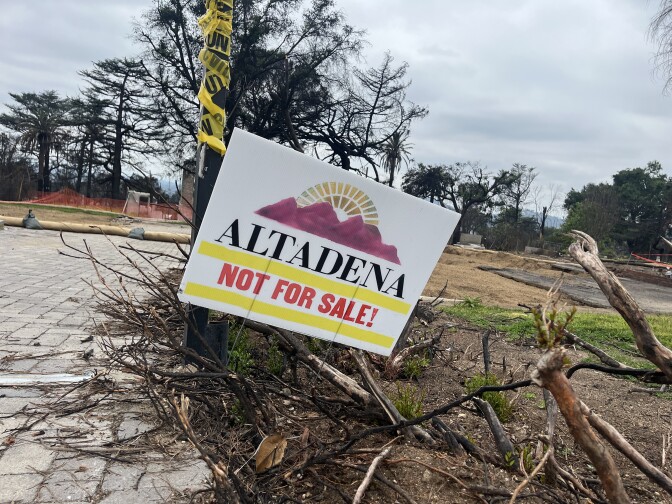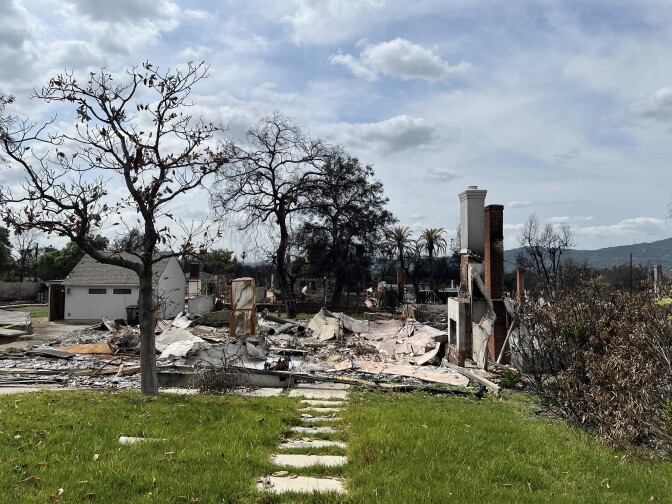This story is free to read because readers choose to support LAist. If you find value in independent local reporting, make a donation to power our newsroom today.
Corporations are buying up Altadena lots. Policies to counter that trend have so far failed

Homes that burned in the Eaton Fire in Altadena are being disproportionately bought up by corporate developers, according to a recent analysis by nonprofit researchers.
Of 241 properties sold through September, more than half went to corporate developers, mostly in West Altadena, according to Strategic Actions for a Just Economy, or SAJE.
“ It's a textbook example of disaster capitalism, where people are targeted while they're grieving and overwhelmed,” said Iris Craige, assistant director of policy and research at SAJE and an author of the report.
What the numbers say
The most recent SAJE report analyzed parcel ownership before and after the Eaton Fire, finding that before the fire, 721 Altadena properties were owned by corporate entities. That’s compared to 7,494 individually owned and 5,878 held by trusts.
After the Eaton Fire, of the 151 post-fire sales from Feb. 11 to July 5, 49% were bought by corporate entities, the SAJE analysis showed. During the same period last year, only 10% of 181 homes for sale went to corporate entities.
Those percentages have only risen in the months since.
Of 241 Altadena lots sold through late September, more than 56% of them have gone to corporate entities, 18 have gone to trusts, 87 to individuals and two to nonprofits, according to the latest data compiled by grassroots group Altadena Not For Sale, analyzed by SAJE and shared with LAist.

Those numbers reflect a failure of policy, Craige said. For example, many Altadena residents have reported receiving predatory calls from developers almost as soon as they learned their homes had burned.
”People that are most susceptible to disaster capitalism are people who are not presented with a lot of choices after the disasters happen,” Craige said. “This is often rooted in historic inequities.”
West Altadena particularly hard hit
The report noted that western Altadena in particular was going through significant change before the fire, and that the lot sales after the fire have only accelerated the existing trend of gentrification.
Neighborhoods west of Lake Avenue in Altadena were historically redlined and became a haven for middle-class Black and brown families in the 1960s and 1970s. Decades later, census data show that Altadena has some of the highest rates of Black homeownership in the country. And people of color made up 58% of the population in the unincorporated community before the Eaton Fire.
Go deeper
But in recent decades, rising property values and living costs have pushed homeowners of color out.
The report noted that in western Altadena, the number of residents of color declined by 20% in some census tracts from 2015 to 2023.
“Every tract in western Altadena has seen an above-county-median increase of the proportion of white residents, and actually the county proportion of white residents as a whole declined over the same period,” Craige said.
Since the Eaton Fire, most of the lot sales have occurred in western Altadena as well, which also suffered the most home losses and lives lost. Of the at least 19 people who died in the Eaton Fire, all but one lived west of Lake Avenue.
“ Altadena was already in crisis before the fire, and the fire really created this second wave of disaster for Altadenans,” Craige said.
Grassroots efforts pop up as state policy falters
The pool of buyers for empty lots is also limited by the complexity of building a home from scratch. So grassroots community efforts have worked to combat the trend of corporate buyouts.
For example, the nonprofit Greenline Housing Foundation has bought lots and supplied several down payment grants to renters who lost their homes in the fire and want to purchase a new home in Altadena.

And more than 1,400 people have signed a grassroots petition to push for policy to slow “corporate real estate grabs” in Altadena.
“What we're seeing is people who have never organized before, they're trying to form land trusts, they're joining tenant unions, they're calling the representatives,” Craige said. “And I think the politicization of Altadenans really speaks to the need that's coming out of that community.”
Go deeper
But policies to help at a broader scale have so far failed.
A bill introduced by state Sen. Sasha Renée Pérez of Pasadena to provide qualified nonprofits and other organizations the first right to purchase land affected by the fire never advanced out of the Senate.
That bill was supported by the Los Angeles Community Land Trust Coalition and the California Community Land Trust Network.
An effort by community members in partnership with Pérez to establish a $200 million community rebuild fund and counter post-fire corporate sales also failed.
Another bill to deter predatory sales calls in the wake of a disaster did pass and is awaiting Gov. Gavin Newsom’s veto or signature.
Corrected October 7, 2025 at 12:09 PM PDT
A previous version of this report included an incorrect number of Altadena properties owned by corporations before the Eaton Fire. The correct number is 721.











